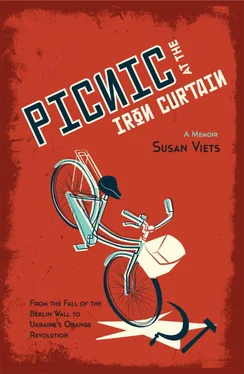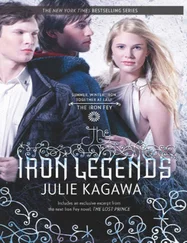“I’ve got to find my thumb,” he muttered. By now his hand was well bandaged. I told him not to stand. He said that he had accidentally cut part of his thumb off while chopping wood at the side of the house. I ran around there; the dog followed, sniffing the ground. He was a Doberman, the one breed that I feared. I pushed the dog away, still a race between us for the thumb.
Louise arrived with a flashlight and held the dog back. I found the thumb. The dog strained under Louise’s grip. She shone the flashlight my way and I felt pleased to see that I held only a small bit of thumb — about half the nail but fortunately cut on a diagonal so that less thumb behind it was gone. Louise held a teacup with cold water. We did not know what to do but put the thumb bit in it.
We returned to the verandah. Sydney sat on a sofa, his head bent low. He said that he felt ill. Louise ran to the kitchen for a bowl; I rushed over to the Land Cruiser so that I could reverse it and face the right direction for the road so that it was ready to depart for the hospital. It was dark and the clearing where the Land Cruiser stood was very small, with a ridge nearby. Unfamiliar with the terrain and hardly able to see, I manoeuvred the Land Cruiser so that it hung over the ridge. I stopped, worried that I might plunge down into the field below, where Louise had warned me not to walk. I shouted. Goran ran out of the house. He directed me back onto flat ground. I shook as we bundled Sydney on board and left for Sarajevo. Sydney sat quietly in the back.
“My thumb throbs,” he said.
“Just scream,” Louise told him. “That’s the best way to manage pain.”
“It’s not in my nature,” Sydney replied. I could see in the rear-view mirror that he sat quietly, hunched forwards, head bowed. I headed for the hospital on the SFOR base.
When we arrived at the base gate, Louise rolled down her window and shouted, “Can somebody help us here? We have an emergency.” The guard, startled, I think, by Louise’s take-charge attitude, opened the barrier and waved us through.
We saw Jeeps and soldiers everywhere and heard helicopters that hovered in the darkness somewhere nearby. Medical personnel ran from a building, and surrounded the Land Cruiser.
“Can he walk?” one man asked us. Sydney mumbled that he could. Medics led us into an emergency room. A tall, broad-shouldered German doctor, who spoke flawless English, tended to Sydney immediately. The doctor told us the thumb bit could not be reattached.
“The wound is good, clean,” he added. He said that he would graft it with artificial skin.
“Did we do the right thing with the thumb bit?” I asked. The doctor described immersion in water as a mistake. “Don’t worry, though, it was too small to be reattached,” he added, whether out of kindness only or clinical truth I did not know.
Goran picked Louise up. I stayed with Sydney in Emergency. He lay on a medical bench that resembled a narrow operating table. I sat in a chair nearby. The doctor said that he would change the dressing on Sydney’s thumb and clean the wound. He left for a while. When he came back, he pulled curtains around the medical bench. Sydney’s feet poked out from under the curtain because he was tall.
I heard a sharp intake of breath from Sydney as the doctor worked. Then I saw his feet arch up in pain. I wanted to pull the curtains back and comfort him but knew that I could do nothing. Then Sydney’s feet went limp. What had happened? I heard the doctor calmly say, “Sydney, open your eyes. Can you hear me, Sydney?” Then medics rushed past with a large machine. I heard beeps and other noises, then saw Sydney’s feet move. A few minutes later the doctor parted the curtains.
“I’m sure you’re wondering what happened,” he said. I was.
The doctor said that Sydney had reacted badly to the anesthetic, lost consciousness and stopped breathing, so he was put on a respirator. I wanted to see him. Medical staff wheeled Sydney out on a stretcher. He looked dead or if not, then close to it. The tears that ran down the side of his face were the only sign of life. He stared up at the ceiling, his pupils the size of pinholes, and did not respond to stimulation. I felt shocked and could not speak.
“Don’t worry. He looks much worse than he is,” the doctor said.
In a daze, I followed the stretcher to the intensive care unit. I wondered about brain damage. An orderly stopped me just inside the entrance. The medical team wheeled Sydney away. The orderly gave me a surgical gown and slippers to put on. Soon the doctor returned.
“He’s talking nonsense,” he said. “Would you like to see him?” I nodded.
“Will he recover?” I asked.
“He should,” the doctor said. Why not, “he will”? Why this qualifier? My heart beat faster. My body moved slower. The doctor led me down a corridor to a bed in a cubicle where Sydney lay.
I spoke softly, stroked his shoulder, told him what had happened. He understood but forgot within seconds. I explained once more. He forgot again.
Machines hummed, someone coughed in a cubicle nearby, Sydney slept. When he woke, he said that his face, which looked normal, felt strange.
Speaking very slowly he said, “My face… feels… like… the… Oslobodjenie building.” I was so happy that he remembered Sarajevo’s hallmark of destruction. I felt hopeful now that he would recover and explained once more what had happened. This time he remembered.
He rested again. As time passed, he spoke in full sentences. At first his thoughts were random thoughts, but then we were able to have short conversations. Then he started to laugh and said, “You have tentacles coming out of your head. You look like an octopus.”
Delusions — what next? The doctor appeared. He examined Sydney, spoke with him and said that Sydney would be fine but that he could not explain the cause of his condition. I sat in the chair as Sydney rested. I thought of Goran and his scars, and wondered if this much can go wrong in peacetime, how bad had it been during the war?
The doctor returned and admitted Sydney to a ward for observation.
“He’s fine,” the doctor said. “We’ll keep him here for some tests. Then he’ll be able to go home.”
A few days later I drove Sydney home from the hospital. As we climbed the steps to our apartment, we saw the neighbour’s children and their uncle. It was nearly a year since we had arrived in Sarajevo and nearly a year since the children’s father had died. Their uncle, remembering too, told us that their father’s death had been the eleventh in the family in five years.
“Everyone else in the war. But my brother, this last one, it’s not knowing what happened that’s the worst.”
I remembered the day well. Sydney and I had just arrived in Sarajevo. We had come home one day and noticed people milling around outside the neighbour’s. Eventually we understood that someone had died, a grandparent, we both assumed.
“ Ne, otac ,” a woman corrected. That word, close enough to the Russian — father. Young, forty-two years old, large, strong, so healthy, we did not understand how. We entered to pay our respects. People sat on sofas and chairs or stood. Everyone drank coffee. We were offered cups of it and joined the group.
A woman who spoke English explained that our neighbour, a bus driver on the Bosnia-Germany route, had been asked, at short notice, to take a tour group to Dubrovnik instead.
“Fate,” she said. “His son heard the news on television, a report on the accident. They announced his name.” Appalled that a five-year-old should learn of his father’s death this way, I asked how he was.
“He and his mother are so traumatized they won’t talk.”
No one knew more than the information provided in the broadcast. The report said the bus had swerved several times on the steep coastal road near Dubrovnik and plunged over the edge — five people were dead, several more wounded. The accident had occurred at about 3 a.m. The bus was discovered the next morning. People at the gathering speculated that our neighbour had either fallen asleep while driving, had a heart attack or been forced to swerve to avoid a collision.
Читать дальше












